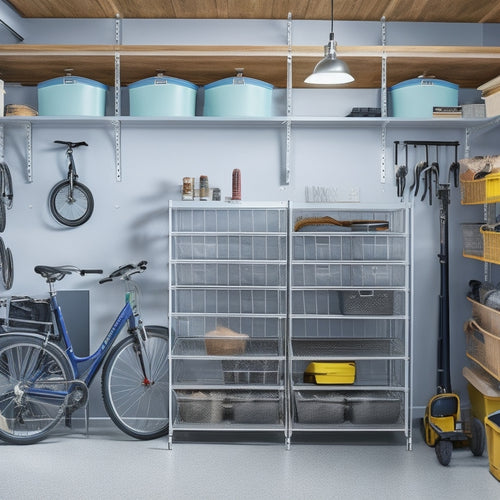
Innovative Small-Scale Manufacturing Ideas for Entrepreneurs
Share
You're poised to capitalize on the thriving small-scale manufacturing landscape, where innovation and adaptability are key to success. Tap into unique product manufacturing ideas like candle making, craft production, or cosmetic manufacturing. Explore emerging industry opportunities in sustainable fashion, urban agriculture, and eco-friendly packaging, where market potential reaches billions by 2025. Or, consider specialized production niches like firearms customization, cannabis industry manufacturing, or continuous manufacturing. To scale your business, identify high-demand products, offer customized production, and focus on sustainable manufacturing. As you navigate these innovative ideas, you'll uncover more opportunities to drive growth and profitability.
Key Takeaways
• Venture into unique product manufacturing ideas like candle making, craft-making, or cosmetic production for a niche market.
• Explore emerging industry opportunities like sustainable fashion, urban agriculture, and eco-friendly packaging for high growth potential.
• Capitalize on specialized production niches like firearms customization, cannabis industry manufacturing, or continuous manufacturing for lucrative opportunities.
• Identify high-demand products or services that align with manufacturing expertise and offer customized production to cater to specific customer requirements.
• Focus on sustainable manufacturing and efficient scaling to meet the increasing demand for eco-friendly products and expand business ventures.
Unique Product Manufacturing Ideas
Explore the uncharted territories of unique product manufacturing by venturing into lesser-known markets, such as candle making, craft-making, or cosmetic production, where you can capitalize on niche demands and differentiate yourself from competitors.
You can create customized jewelry that caters to individual tastes, offering unique designs and personalized messages.
Another area to explore is eco-friendly packaging, which is gaining popularity as consumers become more environmentally conscious. By focusing on sustainable materials and minimal waste, you can appeal to the growing demand for eco-friendly products.
These niche markets offer opportunities to stand out in a crowded industry and attract a loyal customer base.
Emerging Industry Opportunities
As you've capitalized on niche demands in unique product manufacturing, you're now poised to tap into emerging industry opportunities that promise substantial growth and profit. One such area is sustainable fashion, where consumers are willing to pay a premium for eco-friendly clothing. Another lucrative market is urban agriculture, which combines innovative farming techniques with reduced environmental impact.
| Emerging Industry | Market Potential | Growth Drivers |
|---|---|---|
| Sustainable Fashion | $10B by 2025 | Increasing consumer awareness, government regulations |
| Urban Agriculture | $15B by 2027 | Rising demand for locally sourced produce, innovative farming tech |
| Eco-Friendly Packaging | $20B by 2029 | Government bans on single-use plastics, consumer pressure on brands |
These emerging industries offer a unique chance for entrepreneurs to make a mark and reap substantial profits. By tapping into these opportunities, you can stay ahead of the curve and establish a successful small-scale manufacturing business.
Specialized Production Niches
You can capitalize on specialized production niches that cater to specific industries or customer needs, such as firearms production, cannabis industry manufacturing, or continuous manufacturing, which require unique expertise and equipment.
These niches often come with their own set of challenges and regulations, but can be extremely lucrative for those who can navigate them successfully. For instance, firearms customization is a growing market, with enthusiasts willing to pay top dollar for bespoke rifles and handguns.
Similarly, the cannabis industry is crying out for innovative accessories, from vaporizers to grow lights. By tapping into these specialized production niches, you can carve out a profitable niche for yourself and establish a reputation as a go-to expert in your field.
Just remember to do your due diligence and stay on top of industry regulations and trends.
Scalable Business Ventures
Identify scalable business ventures that align with your manufacturing expertise and resources, such as high-demand products or services that can be easily replicated and distributed to meet growing customer needs.
You'll want to focus on areas where you can offer customized production, catering to specific customer requirements. This could be in sustainable manufacturing, where eco-friendly products are in high demand.
Consider your production capacity, supply chain, and logistics to guarantee you can scale up efficiently. With a solid plan in place, you'll be well on your way to expanding your business and meeting the increasing demands of your customers.
Frequently Asked Questions
What Are the Initial Startup Costs for Small-Scale Manufacturing Ventures?
You'll need to crunch numbers, estimating your capital expenditure and crafting financial projections to determine the initial startup costs for your small-scale manufacturing venture, which can range from equipment purchases to facility rentals and more.
How Do I Ensure Product Quality and Consistency in Production?
'Did you know 80% of product defects occur due to poor supply chain management? To guarantee quality and consistency, you'll need to implement robust quality control measures, like regular audits and supplier vetting, to mitigate risks in your supply chain.'
What Are the Necessary Licenses and Permits for Manufacturing Businesses?
You'll need to tackle business registration and compliance issues head-on, ensuring you're licensed to operate and meeting industry standards; don't get caught off guard, research and obtain necessary permits to avoid costly setbacks down the line.
Can I Outsource Manufacturing Processes to Third-Party Contractors?
You're considering outsourcing manufacturing processes to third-party contractors, but don't forget to vet them thoroughly to mitigate risks; make sure they're insured, compliant, and have a solid track record to avoid costly mistakes.
How Do I Protect My Manufacturing Business From Intellectual Property Theft?
You're wise to worry about IP theft! To safeguard your manufacturing business, identify trade secrets, trademark valuable assets, and prepare for patent lawsuits by documenting everything and limiting access to sensitive info.
Related Posts
-

3 Essential Garage Shelving Plans for Bulky Items
You need shelving that can handle the weight of your bulky garage items, with a minimum of 500 pounds per shelf, to g...
-

What's the Best Garage Storage for Small Businesses?
You need a garage storage system that boosts productivity and organization. Maximize vertical space with ceiling-reac...

